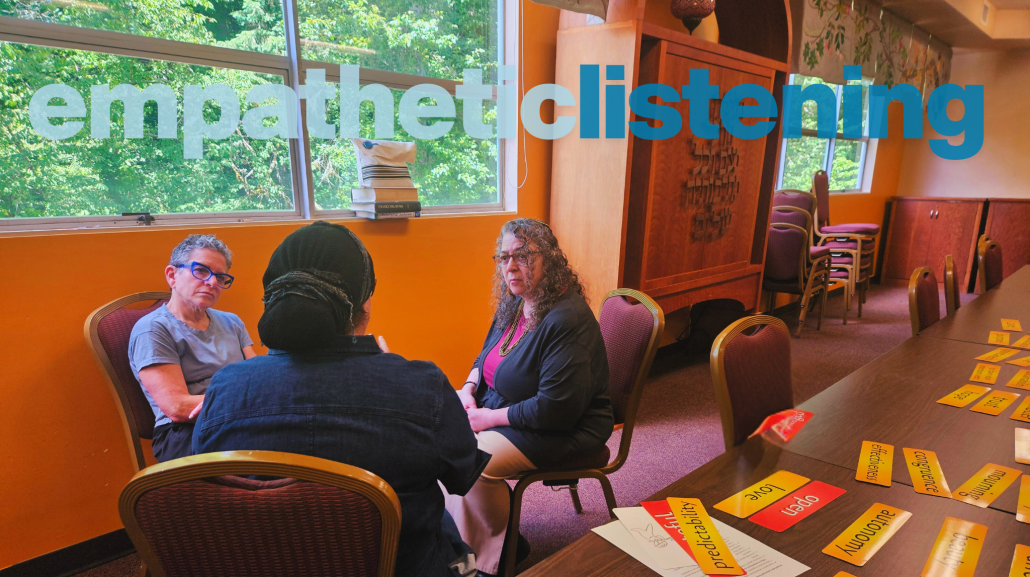Empathetic Listening Session—A healing and helpful protocol for our communities
October 16, 2025
By:
Mel Berwin

Early this summer, I was approached independently and within the same week by two members of my Women’s Torah Study (WTS) group. Both were struggling with their own political ideology in the face of the anti-Jewish and anti-Israel activism in the media, social media, and local environment. I spent about an hour listening to each of them.
In my assessment, both expressed political ideologies that fell well within the expected norms of our relatively diverse, but largely left-leaning and Israel-supporting congregation. Both women voiced a sense of fear and isolation. Neither felt confident that they could hold a conversation with friends, colleagues, or even fellow congregants, due to the polarizing nature of these topics and the fear of losing friendships.
Each of them was so grateful just to be heard and validated, and the interactions lingered with me as well. I began to think about how to encourage a larger group of people to open their hearts and experience the healing power of reflective listening.
Creating Space for Empathetic Connection
In an email message to our Women’s Torah Study group, I shared, “It is complicated to be a human in the world right now–especially a human who cares deeply about Jewish life, Israel, peace, and/or democracy. Because of the complexity of the issues facing us, many of us hold multiple competing and nuanced perspectives, allegiances, and hopes for our people/humanity/the future.”
I invited the group to what I called an “empathetic check-in,” sharing that the purpose would be to share how we’re feeling and support each other in the complexity of the moment, allowing each person to share and be heard in a meaningful way, without a “discussion” of politics and without trying to problem solve or agree/disagree.
Women’s Torah Study is one of the parts of my job that I look forward to the most. The group has been meeting for over fifteen years, approximately 20 women each month. Some attend faithfully each week, while others join as their schedules allow. We are a diverse group, including those who have recently converted and lifelong Jewish learners
This is where I work out my own theology, sharpen the edges of my learning, bring curated texts, and wait to see where the conversation will lead. It’s a group that has already established trust among the diverse participants. Several years ago, we established principles for our study that are printed with our texts each week as reminders. One of them is that we refrain from bringing partisan politics into our conversations.
But here I was inviting the women to join for a conversation to share whatever was on their hearts, as Jews today. I knew for some that would include sharing their own specific political perspectives. In my invitation, I explained that we would be attempting to use “empathetic listening” to break down our sense of isolation and fear. To achieve this, I employed a process similar to the three-person liberating structure known as the “Troika” Protocol or the “Final Word” Protocol, as taught by Kathy Simon during the Mandel Teacher Educator Institute (MTEI). I also used the human feelings/values cards that Kathy introduced to us.
What is Weighing on Your Heart?
Our active question for the session was: “What is weighing on your heart as a Jewish person in the world today?” (Thank you to Miriam Raider-Roth, MTEI Director, for helping with that question!) We began with some text learning, where I demonstrated the protocol we would use. Then, we spent the next hour and a half in a listening and reflection period. The process, instructions, and texts that we used are included below.
During the sharing periods, I saw women crying. I saw women holding hands. I saw them closing their eyes during the silence and exhaling. At the end of the sharing and reflecting, we came back together to discuss the process. The participants were overflowing with appreciation for each other and for the experience. They shared that knowing they could express their thoughts without bracing for an argument, without being on the defensive or offensive, and simply receiving an empathetic response was really healing for their nervous systems. One woman said, “I came in barely knowing anyone, and in just two hours, I feel so connected to my partners. We got to know each other in such a deep way, so quickly.”
Many spoke about how isolated they feel in their jobs, neighborhoods, book groups, and other settings, and how much they valued being able to speak their truth without concern about how their listening partners would respond. Even more, they could hear how similar others felt, even if their politics weren’t exactly the same. They felt like they were on the same side in a more existential way. Several women created a text group after our gathering to stay in touch and continue supporting one another. The group requested that I hold more sessions like this one. I offered a second session the following month, which attracted both repeat attendees and new ones. Feedback was even more overwhelmingly positive after the second session.
Author’s Note:
I am so grateful to have the tools from MTEI to offer this type of listening session to our congregants. If you use this protocol in your own community, I would love to hear about your experience. – Mel
About the Author
Mel has 25 years of experience working in Jewish education and is currently Director of Congregational Learning at Congregation Neveh Shalom in Portland, OR. She is passionate about Hebrew language learning, creating fully inclusive programming, and integrating skills for mental wellness into Jewish education. Her other full-time job is parenting three teenagers, and when it’s not raining, she enjoys walking in wetlands and nature photography.